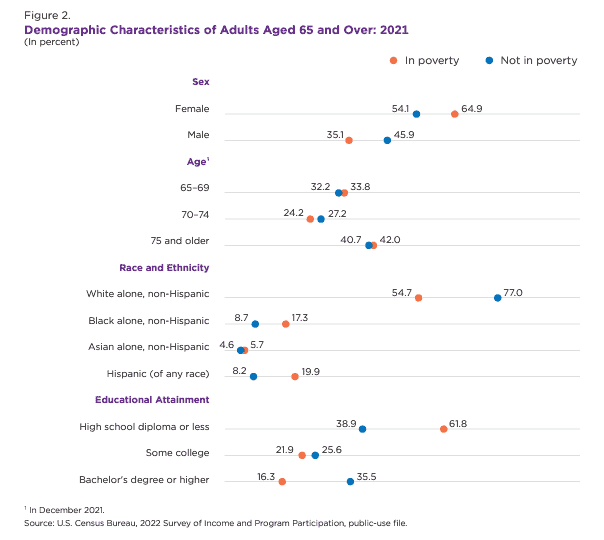Strengthening the Safety Net for Older Adults: Insights from the U.S. Census Bureau’s Latest Report
The Census Bureau’s report, published on June 25, 2024, reveals that 8.3% of individuals aged 65 and over in the United States were living in poverty in 2021. This data, derived from the Survey of Income and Program Participation (SIPP), provides a detailed profile of the 4.7 million older adults experiencing poverty. The SIPP offers valuable insights into income dynamics, employment status, household composition, and government program participation.

Key Findings from the Report
Gender Disparities: The report highlights that women are disproportionately affected by poverty in later life. In 2021, two-thirds of older adults living in poverty were women. Factors such as reduced time in the workforce due to caregiving responsibilities contribute to lower Social Security benefits and increased financial insecurity for older women.
Living Arrangements: The report also notes that a significant number of older adults in poverty live alone. Specifically, 62.9% of older adults in poverty lived alone, compared to just 26.3% of those not in poverty. This living situation often exacerbates financial difficulties, as single-person households may face higher per capita living costs.
Family Dynamics: Among those living with others, the majority of older adults in poverty cohabited with a spouse (65.5%), while a smaller portion lived with children (29.9%) or grandchildren (11.2%).
Poverty in Rhode Island: A Closer Look
In an article by Herb Weiss published in rinewstoday.com, Maureen Maigret, Policy Advisor for the Senior Agenda Coalition of Rhode Island, emphasizes the report’s significance for understanding poverty at the state level. She notes that Rhode Island mirrors national trends, with a particularly troubling statistic: 12.3% of older Rhode Islanders live in poverty, surpassing the national average of 10.9%.
Maigret’s previous research from 2014 indicated a high poverty rate among older women in Rhode Island, with 11.3% living in poverty compared to 9.7% of older men. Furthermore, about 20% of older adults in poverty in Rhode Island are Hispanic or non-Hispanic Black, reflecting broader racial and ethnic disparities. Susan Sweet, founder of the Rhode Island Minority Elder Task Force (RIMETF), highlights several critical issues facing older Rhode Islanders. She points out that many elderly individuals are struggling to meet basic needs such as shelter, food, and healthcare. Sweet emphasizes that state programs often have long application processes and stringent requirements, which can delay or obstruct access to necessary assistance.
RIMETF works to provide direct support to low-income older adults through mini-grants for essential services like rent and utilities. Despite their efforts, the lack of paid staff and limited resources mean that many still face significant challenges. Both Maigret and Sweet call for increased efforts from Rhode Island lawmakers to enhance support for older adults. They advocate for improved policies and better oversight of state and private programs to ensure that assistance reaches those in need in a timely and effective manner.
Maigret urges policymakers to consider the national and state-level data when formulating strategies to combat senior poverty. Sweet emphasizes the importance of grassroots understanding and accountability to address the real gaps in support available to older adults.
The U.S. Census Bureau’s report on older adults’ poverty status serves as a crucial reminder of the ongoing financial struggles faced by many. With 12.3% of older Rhode Islanders living in poverty, it is clear that more work is needed to strengthen the safety net. Enhanced Social Security benefits, improved healthcare access, and more responsive state programs are essential to improving the economic security of older Americans. For further details on the Census Bureau’s findings, the full report can be accessed HERE.
